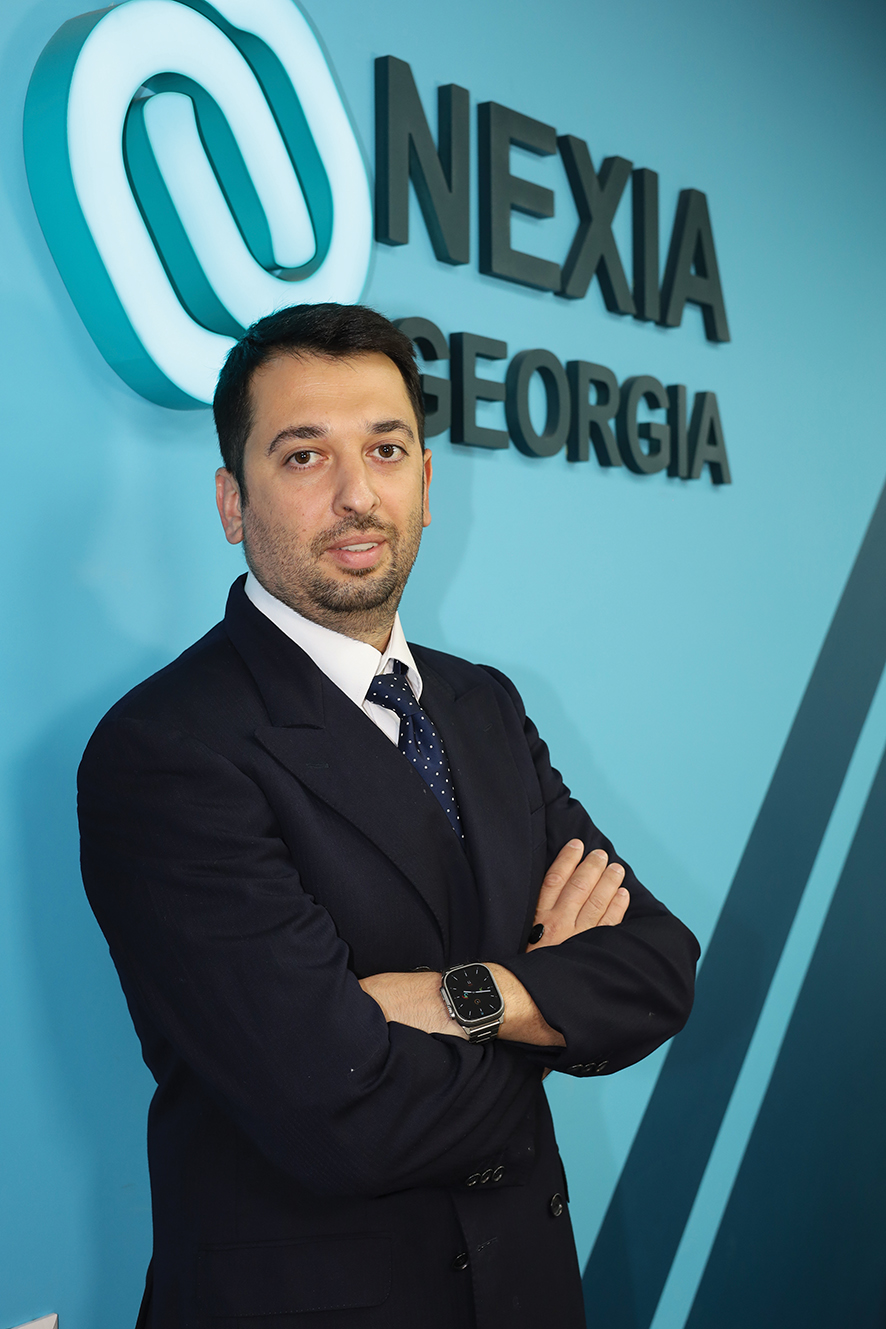As accounting outsourcing continues to mature in Georgia, it is increasingly recognized not merely as a cost-optimization tool, but as a strategic function that enhances operational transparency, reduces risk, and supports business growth. To examine this evolving landscape, we conducted in-depth interviews with three senior leaders at Nexia Georgia: David Lomidze, Managing Partner and Head of Accounting Outsourcing, Lika Koguashvili, Director of Quality and Development of the Accounting and Reporting Department and David Orjonikidze, Tax Director of the Accounting and Reporting Department. Together, they offer a detailed look into how Nexia has developed one of Georgia’s most sophisticated outsourcing practices — with structured processes, advanced technology, and a commitment to international standards.

The New Expectations: Clients Want Strategic Partners, Not Just Accountants
According to David Lomidze, the market’s expectations have evolved significantly.
“The accounting outsourcing market in Georgia is developing rapidly,” he tells us. “Companies have realized that outsourcing is not just a way to optimize costs, it is a long-term strategic decision that increases reliability, improves process transparency and reduces tax risks.”
He explains that modern clients expect more than traditional accounting.
“Expectations for service are also gradually becoming higher: today, companies need not just an accountant, but a professional partner who sees processes in depth, ensures technological integration, protects against financial risks and creates a structure that actually helps in business development,” he notes.
Nexia’s Advantage: Structured Processes and Technological Leadership
Lomidze highlights that Nexia’s competitive edge lies in the combination of disciplined processes and innovation” “Our main advantage is quality, and this means not only the result, but also the process. Our accounting outsourcing service is based on strict internal standards and a multi-layered quality control system. Each project goes through special methodological and tax control stages. In addition, each accountant is supported by a multidisciplinary team and two supervisory managers, which further reduces the likelihood of errors and increases the quality of client protection.”
He also emphasizes Nexia’s pioneering use of automation in Georgia “In addition to human resources, our strong advantage is technological innovations. Nexia Georgia was the first company in Georgia to introduce robotic technologies into accounting. This approach made it possible to automate standard operations, minimize the risk of errors, and focus the team on analytics and in-depth financial issues.”
Cybersecurity plays a key role as well. “Information security is also critically important for the business sector. We are the first audit company in Georgia and the entire region to implement the latest, 2022 version of the international cybersecurity standard – ISO 27001. For clients, this means one of the most secure and reliable financial partnerships in the region,” he says.
With all this in place, Lomidze concludes. “I can confidently say that Nexia Georgia has a large and strong practice in the field of outsourcing in the country today. In this direction alone, we serve about 300 active companies and are market leaders.”

Client Profile: Which Companies Use Outsourcing, and Why?
When asked which types of companies typically rely on outsourcing, Lomidze responded: “Our services are especially in demand among large and medium-sized companies that require structured accounting services, high-level financial reporting and professional partnership. Practice has shown that the more complex the business, the more value accounting outsourcing creates.”
Nexia’s reach is broad across industries.
“Today, we serve almost all important sectors in Georgia, starting with construction, medical, financial sectors, continuing with trade, manufacturing, technology companies and representatives of international groups,” he tells us.
Importantly, Lomidze notes Nexia’s commitment to smaller businesses as well: “By the way, in recent years, based on market needs, we have created a special service for small businesses, Nexia 4SME, the goal of which is to provide small companies and startups with access to international-level services, with a budget tailored to them.”
Implementation Process: Structure Without Disruption
Discussing the onboarding process, David Lomidze describes Nexia’s structured and risk-mitigating approach: “Outsourcing implementation at Nexia is a strictly structured and quality-oriented process. At the first stage, we begin an in-depth diagnosis: we assess the quality of the client’s data, financial processes and software, and identify the risks and opportunities that may affect the quality of the service.Then we create a detailed individual plan which outlines how information will be transferred, data integrated, the new system launched, etc.”
The focus is on ensuring smooth transitions.
“Our priority is that the implementation of the service does not disrupt the client’s ongoing operations in any way, but rather, that they gradually feel the improvement, more control, saved time and predictable results,” he says. And, ultimately, a transformation; “Ultimately, outsourcing is transformed into a kind of internal service, managed by a high-level professional team, with international standards, technologies and full responsibility.”
Why the Market Is Growing: Complexity, Risk, and New Expectations
Reflecting on market trends, Lomidze identifies the key drivers of growth in accounting outsourcing.
“Interest is steadily growing and this is due to several factors, first: a new generation is entering management which is more focused on results and process optimization. Second: regulations and legislation are becoming more complex every year, and the price of making an error is increasing, both financially and in terms of reputation.”
He continues: “It is becoming critical for businesses that accounting, payment, and financial areas are led by a reliable and professional team with clear standards, oversight mechanisms and a strong accountability system.”
He then emphasizes the technological factor; “Technological progress is also an important factor: technologies allow companies to organize financial processes more quickly, accurately and transparently. It is especially important that the outsourcing company itself is technologically advanced, creating a new standard of service quality.”
Efficiency and Value: How Outsourcing Helps Clients Thrive
According to Lomidze, outsourcing directly contributes to a company’s efficiency: “Outsourcing allows a business to focus all its energy and resources on its core business so that financial processes are managed professionally and stably. The company no longer has to hire, retrain, monitor and administer an internal accounting team, which in itself saves significant financial and human resources.”
It also delivers stability, he says.
“In addition, outsourcing ensures continuity and reliability of service: the service does not stop due to employee vacation, illness or other changes. For the client, this means not only cost optimization, but also transparency of processes, predictable budgeting, and decisions made based on accurate data.”
Quality Control: A System of Oversight, Training, and Innovation
Lika Koguashvili, Director of Quality and Development of the Accounting and Reporting Department, provides insight into Nexia’s quality control mechanisms.
“Quality control in accounting services at Nexia is approached on two fronts,” she explains. “First, we develop comprehensive accounting control manuals, which include clear guidelines on implementation and archiving procedures. Second, we employ a two-tier review process to ensure both quality and compliance – beginning with the chief accountant and advancing through managerial oversight to the director level.”
She explains the standards used: “We ensure our accounting practices align with international financial reporting and accounting standards. To maintain quality, we’ve adopted internationally recognized best practices while incorporating local expertise from Georgia’s accounting sector, ensuring full compliance with legislative requirements.”
When it comes to team development, she highlights a strong commitment to continuous learning. “The growth and qualification of our team is fundamental to our success,” she states. “Our system rests on two pillars: first, the careful selection of training topics and delivery of both one-time and ongoing courses through our in-house academy; second, a structured mentoring program that pairs less experienced employees with seasoned professionals for hands-on training and knowledge-sharing.”
Koguashvili also outlines Nexia’s innovation strategy: “In today’s market, it’s not enough to respond to current demand—we aim to anticipate future business needs. We strive to introduce solutions that will become essential tomorrow. Alongside this, we continually explore emerging technologies in software quality control, cybersecurity, and both financial and tax accounting.”
On client engagement she explains: “Ongoing dialogue with our partners—through feedback, surveys, and in-depth research—is key to our mutual success. We’ve turned years of experience into structured processes that support strong, reliable, and mutually beneficial relationships with our partner companies.”

Tax Services: Compliance, Continuity, and Coordination
David Orjonikidze, Tax Director of the Accounting and Reporting Department at Nexia Georgia, explains how tax oversight is integrated into outsourcing services: “Our approach is based on risk-based analysis. We study the client’s business in detail, identify possible tax risks and offer legally sound, practical solutions. At the same time, we help systematize processes, which reduces risk and makes them predictable. Ensures continuity.”
He outlines the typical areas of client concern: “Questions mainly concern the interpretation of the Tax Code, the correct use of VAT and profit tax benefits, taxation of international operations, relations with non-residents, and tax obligations of founders.”
On legislative changes, Orjonikidze highlights Nexia’s proactive approach: “Nexia monitors changes in legislation on an ongoing basis. As soon as the changes come into force, we analyze their impact on clients, update internal processes, and share specific recommendations with clients. This proactive approach allows us to keep clients constantly protected and informed.”
His role within the broader outsourcing strategy is clear: “My main role is to ensure that the tax system works in an integrated manner across the entire outsourcing department: this includes both effective tax consulting and process automation and embedding control mechanisms into client services,” he says. “This enhances the quality of service and significantly reduces the client’s tax risks.”
Coordination across departments is a major strength.
“At Nexia, we have strong and coordinated teams in accounting, legal, tax and business consulting. Their coordinated work allows us to offer clients comprehensive and customized services tailored to their specific needs from a single space.”
He reflects on the future of the industry: “With the growth of digital technologies, company requirements are shifting from accuracy to analytics. There is an increasing demand for intelligent services where automation, control mechanisms, and tax consulting function as a unified ecosystem. This is what gives our accounting outsourcing service a significant competitive advantage.”
By Kesaria Katcharava














